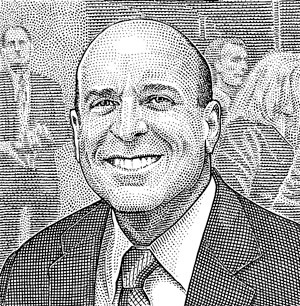Paul Brodeur ’86 is Elected to Massachusetts State House
By Matt Sinclair ’90
BUILDING TRUST takes time. That’s a lesson Paul Brodeur ’86 has learned as a new member of the Massachusetts House of Representatives.
A government and law graduate with a J.D. from Suffolk University Law School, Boston, Brodeur was elected November 2 to represent a district that includes his hometown of Melrose and some precincts of neighboring Wakefield. He was sworn in January 5 and is pleased with how things have gone so far, he says. “But there’s one important caveat. We haven’t confronted any of the contentious issues in formal debate. Things will get a little more challenging.”
 Brodeur, a Democrat, served as an alderman in Melrose from 2002 to 2010. He has also served as acting general counsel for the state’s Executive Office of Elder Affairs, an enforcement attorney for the Massachusetts Securities Division, and a prosecutor in Middlesex County.
Brodeur, a Democrat, served as an alderman in Melrose from 2002 to 2010. He has also served as acting general counsel for the state’s Executive Office of Elder Affairs, an enforcement attorney for the Massachusetts Securities Division, and a prosecutor in Middlesex County.
While Massachusetts is in better shape than some states, according to Brodeur, it still faces serious questions about such issues as health insurance, pension benefits, and legalized gaming. A member of three joint committees of the House — Consumer Protection and Professional Licensure, Economic Development and Emerging Technologies, and Public Service — Brodeur will have a hand in crafting legislation that could affect significant areas of economic recovery in the state.
One legislative item not completed in the previous session that could pay off for the state is gaming. The state owns racetracks that failed and is debating whether to build casinos, “racinos” (slot machine parlors at racetracks), or some combination. Gaming is a revenue stream that is fraught with political plays, ethical concerns, and the potential for disapproval from a large number of citizens. “My role as a legislator is to balance competing interests and do what is best for the state as a whole,” Brodeur says.
The time he spends with individual citizens provides opportunities to have a significant positive influence on people’s lives. When he worked in the Office of Elder Affairs, he saw firsthand how families struggle to do what is right for their parents and other loved ones. “As a state representative, the most important thing I can do is help people navigate the bureaucracy,” he says. “When the time comes, that’s the job.”
The job can also include advocating for a cause that might not directly benefit all voters, such as building new schools. As alderman, he helped lead a campaign for a new middle school to replace the facility he attended growing up. (“It was failing when I was there,” he says.) When many residents have already seen their children graduate, the issue of using tax dollars to build a new school can be contentious. “You make the pitch about why it’s important,” he says. “You can’t just argue pocketbook. This will make a difference for future generations of kids.”
Giving back to people and places that played a role in his life is crucial to Brodeur. When he told his former government and law professor James Lennertz that he was running for representative, Lennertz informed his students, and soon Jamie Flaherty ’12 was serving as an intern on Brodeur’s campaign. “She did a great job,” Brodeur says. “She’s interested in becoming a lawyer, and we’re trying to arrange an internship for her.”
As an attorney and an elected official, Brodeur enjoys helping influence change and making a difference in people’s lives. “It’s humbling and empowering to stand up for a person,” he says. “To be able to make change happen is a great feeling. I’ve had jobs I didn’t love so much, and it’s a lot better to be in a job you love.”